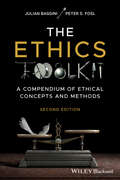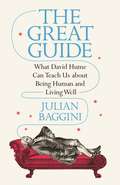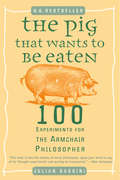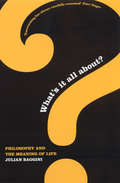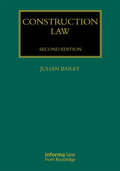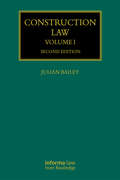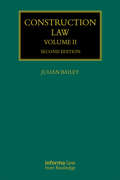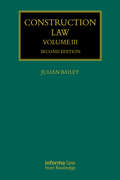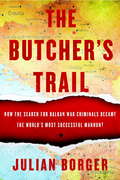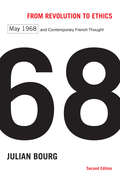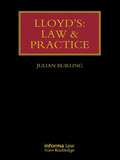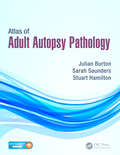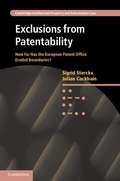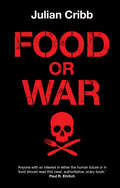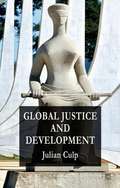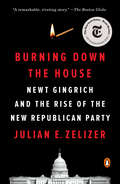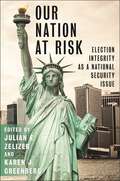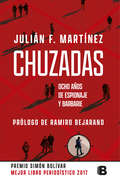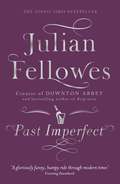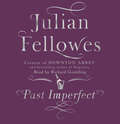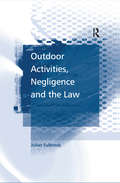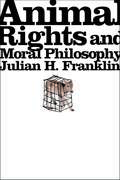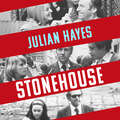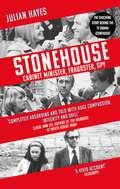- Table View
- List View
The Ethics Toolkit: A Compendium of Ethical Concepts and Methods
by Julian Baggini Peter S. FoslA new edition of the bestselling guide which equips readers with the skills necessary for engaging in ethical reflection The Ethics Toolkit offers an engaging and approachable introduction to the core concepts, principles, and methods of contemporary ethics. Explaining to students and general readers how to think critically about ethics and actually use philosophical concepts, this innovative volume provides the tools and knowledge required to engage intelligently in ethical study, deliberation, and debate. Invaluable as both a complete guide and a handy reference, this versatile resource provides clear and authoritative information on a diverse range of topics, from fundamental concepts and major ethical frameworks to contemporary critiques and ongoing debates. Throughout the text, Fosl and Baggini highlight the crucial role ethics plays in our lives, exploring autonomy, free will, consciousness, fairness, responsibility, consent, intersectionality, sex and gender, and much more. Substantially revised and expanded, the second edition of The Ethics Toolkit contains a wealth of new entries, new recommended readings, more detailed textual references, and numerous timely real-world and hypothetical examples. Uses clear and accessible language appropriate for use inside and beyond the classroom Contains cross-referenced entries to help readers connect and contrast ideas Engages both non-Western and Western philosophy Offer insights into key issues in ethics with a firm grounding in the history of philosophy Includes an appendix of tools for the practice of ethics, including links to podcasts, web and print resources, and prominent ethics organizations Written by the authors of the popular The Philosophers’ Toolkit, this new edition of The Ethics Toolkit is a must-have resource for anyone interested in ethics, from general readers to undergraduate and graduate students.
The Great Guide: What David Hume Can Teach Us about Being Human and Living Well
by Julian BagginiInvaluable wisdom on living a good life from one of the Enlightenment's greatest philosophersDavid Hume (1711–1776) is perhaps best known for his ideas about cause and effect and his criticisms of religion, but he is rarely thought of as a philosopher with practical wisdom to offer. Yet Hume's philosophy is grounded in an honest assessment of nature—human nature in particular. The Great Guide is an engaging and eye-opening account of how Hume's thought should serve as the basis for a complete approach to life.In this enthralling book, Julian Baggini masterfully interweaves biography with intellectual history and philosophy to give us a complete vision of Hume's guide to life. He follows Hume on his life's journey, literally walking in the great philosopher's footsteps as Baggini takes readers to the places that inspired Hume the most, from his family estate near the Scottish border to Paris, where, as an older man, he was warmly embraced by French society. Baggini shows how Hume put his philosophy into practice in a life that blended reason and passion, study and leisure, and relaxation and enjoyment.The Great Guide includes 145 Humean maxims for living well, on topics ranging from the meaning of success and the value of travel to friendship, facing death, identity, and the importance of leisure. This book shows how life is far richer with Hume as your guide.
The Pig That Wants to Be Eaten
by Julian BagginiThe author presents 100 thought experiments, and invites the reader to think about possible answers. Experiments cover identity,religion, art, ethics, language, knowledge and many more. Baggini offers some ways of approaching each problem.
What's It All About?: Philosophy & the Meaning of Life
by Julian Baggini&“Secular-minded readers seeking an alternative to The Purpose-Driven Life have an excellent starting point here.&”—Publishers Weekly For readers who are serious about confronting the big issues in life—but are turned off by books which deal with them through religion, spirituality, or psychobabble, this is an honest, intelligent discussion by a philosopher that doesn't hide from the difficulties or make undeliverable promises. It aims to help the reader understand the overlooked issues behind the obvious questions, and shows how philosophy does not so much answer them as help provide us with the resources to answer them for ourselves. &“Useful and provocative.&”—The Wall Street Journal &“Looking for a clear guide to what contemporary philosophy has to say about the meaning of life? Baggini takes us through all the plausible answers, weaving together Kierkegaard, John Stuart Mill, Monty Python, and Funkadelic in an entertaining but always carefully reasoned discussion.&”—Peter Singer, author of How Are We To Live &“The question of the meaning of life has long been a byword for pretentious rambling. It takes some nerve to tackle it in a brisk and no-nonsense fashion.&”—New Statesman
Construction Law: A Festschrift For Lord Justice Jackson (Construction Practice Series)
by Julian BaileyNow in its second edition, Construction Law is the standard work of reference for busy construction law practitioners, and it will support lawyers in their contentious and non-contentious practices worldwide. Published in three volumes, it is the most comprehensive text on this subject, and provides a unique and invaluable comparative, multi-jurisdictional approach. This book has been described by Lord Justice Jackson as a "tour de force", and by His Honour Humphrey LLoyd QC as "seminal" and "definitive". This new edition builds on that strong foundation and has been fully updated to include extensive references to very latest case law, as well as changes to statutes and regulations. The laws of Hong Kong and Singapore are also now covered in detail, in addition to those of England and Australia. Practitioners, as well as interested academics and post-graduate students, will all find this book to be an invaluable guide to the many facets of construction law.
Construction Law: Volume I (Construction Practice Series)
by Julian BaileyNow in its second edition, Construction Law is the standard work of reference for busy construction law practitioners, and it will support lawyers in their contentious and non-contentious practices worldwide. Published in three volumes, it is the most comprehensive text on this subject, and provides a unique and invaluable comparative, multi-jurisdictional approach. This book has been described by Lord Justice Jackson as a "tour de force", and by His Honour Humphrey LLoyd QC as "seminal" and "definitive". This new edition builds on that strong foundation and has been fully updated to include extensive references to very latest case law, as well as changes to statutes and regulations. The laws of Hong Kong and Singapore are also now covered in detail, in addition to those of England and Australia. Practitioners, as well as interested academics and post-graduate students, will all find this book to be an invaluable guide to the many facets of construction law.
Construction Law: Volume II (Construction Practice Series)
by Julian BaileyNow in its second edition, Construction Law is the standard work of reference for busy construction law practitioners, and it will support lawyers in their contentious and non-contentious practices worldwide. Published in three volumes, it is the most comprehensive text on this subject, and provides a unique and invaluable comparative, multi-jurisdictional approach. This book has been described by Lord Justice Jackson as a "tour de force", and by His Honour Humphrey LLoyd QC as "seminal" and "definitive". This new edition builds on that strong foundation and has been fully updated to include extensive references to very latest case law, as well as changes to statutes and regulations. The laws of Hong Kong and Singapore are also now covered in detail, in addition to those of England and Australia. Practitioners, as well as interested academics and post-graduate students, will all find this book to be an invaluable guide to the many facets of construction law.
Construction Law: Volume III (Construction Practice Series)
by Julian BaileyNow in its second edition, Construction Law is the standard work of reference for busy construction law practitioners, and it will support lawyers in their contentious and non-contentious practices worldwide. Published in three volumes, it is the most comprehensive text on this subject, and provides a unique and invaluable comparative, multi-jurisdictional approach. This book has been described by Lord Justice Jackson as a "tour de force", and by His Honour Humphrey LLoyd QC as "seminal" and "definitive". This new edition builds on that strong foundation and has been fully updated to include extensive references to very latest case law, as well as changes to statutes and regulations. The laws of Hong Kong and Singapore are also now covered in detail, in addition to those of England and Australia. Practitioners, as well as interested academics and post-graduate students, will all find this book to be an invaluable guide to the many facets of construction law.
The Butcher's Trail
by Julian BorgerThe gripping, untold story of The International Criminal Tribunal for the former Yugoslavia and how the perpetrators of Balkan war crimes were captured by the most successful manhunt in historyWritten with a thrilling narrative pull, The Butcher's Trail chronicles the pursuit and capture of the Balkan war criminals indicted by the International Criminal Tribunal in The Hague. Borger recounts how Radovan Karad ić and Ratko Mladić--both now on trial in The Hague--were finally tracked down, and describes the intrigue behind the arrest of Slobodan Milosevic, the Yugoslav president who became the first head of state to stand before an international tribunal for crimes perpetrated in a time of war. Based on interviews with former special forces soldiers, intelligence officials, and investigators from a dozen countries--most speaking about their involvement for the first time--this book reconstructs a fourteen-year manhunt carried out almost entirely in secret. Indicting the worst war criminals that Europe had known since the Nazi era, the ICTY ultimately accounted for all 161 suspects on its wanted list, a feat never before achieved in political and military history.
From Revolution to Ethics: May 1968 and Contemporary French Thought (2nd Edition)
by Julian BourgWinner: CHOICE Outstanding Academic Book Award, CHOICE Magazine (2008). Winner: Morris D. Forkosch Prize for the best book in intellectual history, Journal of the History of Ideas (2008). The French revolts of May 1968, the largest general strike in twentieth-century Europe, were among the most famous and colourful episodes of the twentieth century. Julian Bourg argues that during the subsequent decade the revolts led to a remarkable paradigm shift in French thought - the concern for revolution in the 1960s was transformed into a fascination with ethics. Challenging the prevalent view that the 1960s did not have any lasting effect, From Revolution to Ethics shows how intellectuals and activists turned to ethics as the touchstone for understanding interpersonal, institutional, and political dilemmas. In absorbing and scrupulously researched detail Bourg explores the developing ethical fascination as it emerged among student Maoists courting terrorism, anti-psychiatric celebrations of madness, feminists mobilizing against rape, and pundits and philosophers championing humanitarianism. From Revolution to Ethics provides a compelling picture of how May 1968 helped make ethics a compass for navigating contemporary global concerns. In a new preface for the second edition published to mark the fiftieth anniversary of the events, Bourg assessses the worldwide influence of the ethical turn, from human rights to the return of religion and the new populism.
Lloyd's: Law And Practice (Lloyd's Insurance Law Library)
by Julian BurlingThe unique features of the Lloyd’s Corporation and Market and their governing rules are complex and are often difficult to navigate even for the most seasoned practitioner. This book provides the reader with a definitive and detailed guide, and is essential for any practitioner dealing with Lloyd’s Insurance. After a brief historical account, the book provides a thorough legal description and analysis of Lloyd’s, which includes topics ranging from the constitution and membership requirements of Lloyd’s, UK and overseas regulation, the processes for placing and underwriting business and handling claims, chain of security, enforcement and disciplinary matters, compensation and the reconstruction and the renewal of the Lloyd’s market between 1990 and 1996. The book will be an invaluable reference tool for insurance practitioners and professionals dealing with Lloyd’s. Julian Burling is a barrister at Serle Court, and has been involved in advising on and implementing nearly all significant legal developments at Lloyd’s in the last 25 years.
Atlas of Adult Autopsy Pathology
by Stuart Hamilton Julian Burton Sarah SaundersThe Atlas of Adult Autopsy Pathology is a full-color atlas for those performing, or learning to perform, adult autopsies. It is arranged by organ systems and also includes chapters on external examination findings, the effect of decomposition, and histopathological findings, as well as procedures and devices one may encounter during autopsy.The boo
Exclusions from Patentability
by Sigrid Sterckx Julian CockbainExclusions from Patentability reviews the history of the adoption of exclusions from patentability under the European Patent Convention since its first conception in 1949 through to its most recent revision. The analysis shows how other intellectual property treaties, such as UPOV, the Strasbourg Patent Convention, PCT, the EU Biotech Directive and TRIPS have affected the framing of the exclusions. Particular attention is given to those exclusions considered the most contentious (computer programmes, discoveries, medical treatments, life forms and agriculture) and those decisions which have been most influential in shaping the approaches by which the exclusions have been interpreted. The 'morality' exclusion and the interpretation of the exclusions are discussed critically and suggestions for coherent interpretation are made.
Food or War
by Julian CribbOurs is the Age of Food. Food is a central obsession in all cultures, nations, the media, and society. Our future supply of food is filled with risk, and history tells us that lack of food leads to war. But it also presents us with spectacular opportunities for fresh human creativity and technological prowess. Julian Cribb describes a new food system capable of meeting our global needs on this hot and overcrowded planet. This book is for anyone concerned about the health, safety, affordability, diversity, and sustainability of their food - and the peace of our planet. It is not just timely - its message is of the greatest urgency. Audiences include consumers, 'foodies', policymakers, researchers, cooks, chefs and farmers. Indeed, anyone who cares about their food, where it comes from and what it means for them, their children and grandchildren.
Global Justice And Development
by Julian CulpDefending a procedural conception of global justice that calls for the establishment of reasonably democratic arrangements within and beyond the state, this book argues for a justice-based understanding of social development and justifies why a democracy-promoting international development practice is a requirement of global justice.
Burning Down the House: Newt Gingrich, the Fall of a Speaker, and the Rise of the New Republican Party
by Julian E. ZelizerThe story of how Newt Gingrich and his allies tainted American politics, launching an enduring era of brutal partisan warfare When Donald Trump was elected president in 2016, President Obama observed that Trump &“is not an outlier; he is a culmination, a logical conclusion of the rhetoric and tactics of the Republican Party.&” In Burning Down the House, historian Julian Zelizer pinpoints the moment when our country was set on a path toward an era of bitterly partisan and ruthless politics, an era that was ignited by Newt Gingrich and his allies. In 1989, Gingrich brought down Democratic Speaker of the House Jim Wright and catapulted himself into the national spotlight. Perhaps more than any other politician, Gingrich introduced the rhetoric and tactics that have shaped Congress and the Republican Party for the last three decades. Elected to Congress in 1978, Gingrich quickly became one of the most powerful figures in America not through innovative ideas or charisma, but through a calculated campaign of attacks against political opponents, casting himself as a savior in a fight of good versus evil. Taking office in the post-Watergate era, he weaponized the good government reforms newly introduced to fight corruption, wielding the rules in ways that shocked the legislators who had created them. His crusade against Democrats culminated in the plot to destroy the political career of Speaker Wright. While some of Gingrich&’s fellow Republicans were disturbed by the viciousness of his attacks, party leaders enjoyed his successes so much that they did little collectively to stand in his way. Democrats, for their part, were alarmed, but did not want to sink to his level and took no effective actions to stop him. It didn&’t seem to matter that Gingrich&’s moral conservatism was hypocritical or that his methods were brazen, his accusations of corruption permanently tarnished his opponents. This brand of warfare worked, not as a strategy for governance but as a path to power, and what Gingrich planted, his fellow Republicans reaped. He led them to their first majority in Congress in decades, and his legacy extends far beyond his tenure in office. From the Contract with America to the rise of the Tea Party and the Trump presidential campaign, his fingerprints can be seen throughout some of the most divisive episodes in contemporary American politics. Burning Down the House presents the alarming narrative of how Gingrich and his allies created a new normal in Washington.
Our Nation at Risk: Election Integrity as a National Security Issue
by Julian E. Zelizer and Karen J. GreenbergThe nation's top political scientists, historians, and legal scholars propose solutions for democracy's futureIn recent years, the sight of gun-wielding citizens patrolling ballot boxes and voting sites has become increasingly familiar. Major news corporations parroting false claims of election fraud, ballot stuffing, and faulty voting systems is the new normal. In an era of global anti-democratic movements, the sanctity of democratic electoral processes has become a major national security concern, and the need to protect elections from foreign interference, disinformation, voter intimidation, and the danger of election results being overturned, are now front and center. How did we get here? And more importantly, how will this affect the future of democracy?Award-winning authors Julian E. Zelizer and Karen J. Greenberg bring together the nation’s top political scientists, historians, and legal scholars to examine how the lack of stability and integrity of the electoral process has become a threat to national security. Through historical and social scientific analysis, contributors outline how these problems have emerged and propose concrete solutions to move us into a period of greater stability. At once urgent and comprehensive, Our Nation at Risk is the preeminent book on election security and a must read for anyone invested in the fight for democracy.
Chuzadas: Ocho años de espionaje y barbarie
by Julian F. MartínezLa historia detrás de las chuzadas del DAS. Aunque el tema es parcialmente conocido, el reportero Julián F. Martínez en esta impresionante investigación, logra poner en contexto -además de adicionar datos aún desconocidos y una rigurosa documentación-, uno de los periodos más oscuros de la historia política del país. Más allá de lo que se llamaron las chuzaDas, este libro aborda otros hechos graves como espionaje, amenazas, persecución y asesinatos. «ChuzaDAS es un documento que hace parte de la memoria histórica de uno de los peores episodios de los servicios de inteligencia de Colombia. Es un texto de consulta en donde cada una de las aseveraciones está comprobada con fechas, documentos de soporte y datos de contexto. Este libro es uno de los mejores trabajos de Julián F. Martínez, ya que gracias a su exhaustiva investigación demuestra que por órdenes del gobierno de turno se interceptaron diferentes periodistas, magistrados, jueces y miembros de la oposición política del momento. ChuzaDAS es y será, sin duda, un libro de referencia en elque se estudia cómo la manera de gobernar nunca debería deformarse o desvirtuarse para convertirse en persecución y espionaje». Yohir Akerman
Past Imperfect: A novel by the creator of DOWNTON ABBEY and BELGRAVIA
by Julian FellowesA SUNDAY TIMES BESTSELLERFROM THE CREATOR OF DOWNTON ABBEY and BELGRAVIA'A gloriously funny ride through modern times' Evening StandardDamian Baxter is very, very rich. But he has but one concern, which is becoming more urgent at the weeks go by: who should inherit his fortune. A letter from an ex-girlfriend suggests that, as a young man, Damian may have fathered a child, but the letter is anonymous. Finding the truth will not be easy - and the only man who Damian can turn to for help also happens to be his sworn enemy... 'A must-read' Sunday Express'An elegant satire, it offers an entertaining commentary on our times and a heartfelt lament for a kinder, more courteous Britain' Tatler'A witty take on the world as it was and is now' Woman & Home
Past Imperfect: A novel by the creator of DOWNTON ABBEY and BELGRAVIA
by Julian FellowesA SUNDAY TIMES BESTSELLERFROM THE CREATOR OF DOWNTON ABBEY and BELGRAVIA 'A gloriously funny ride through modern times' Evening Standard Damian Baxter is very, very rich. But he has but one concern, which is becoming more urgent at the weeks go by: who should inherit his fortune. A letter from an ex-girlfriend suggests that, as a young man, Damian may have fathered a child, but the letter is anonymous. Finding the truth will not be easy - and the only man who Damian can turn to for help also happens to be his sworn enemy... 'A must-read' Sunday Express'An elegant satire, it offers an entertaining commentary on our times and a heartfelt lament for a kinder, more courteous Britain' Tatler'A witty take on the world as it was and is now' Woman & Home
Past Imperfect: From the creator of DOWNTON ABBEY and THE GILDED AGE
by Julian FellowesDamian Baxter is very, very rich - and he's dying. He lives alone in a big house in Surrey, looked after by a chauffeur, butler, cook and housemaid. He has but one concern: who should inherit his fortune...PAST IMPERFECT is the story of a quest. Damian Barker wishes to know if he has a living heir. By the time he married in his late thirties he was sterile (the result of adult mumps), but what about before that unfortunate illness? He was not a virgin. Had he sired a child? A letter from a girlfriend from these times suggests he did. But the letter is anonymous.Damian contacts someone he knew from their days at university. He gives him a list of girls he slept with and sets him a task: find his heir...
Outdoor Activities, Negligence and the Law
by Julian FulbrookRecent years have witnessed several tragedies during school and youth expeditions. This in turn has led to legislation and the tight regulation of Outdoor Activity Centres, with successive governments issuing guidelines for teachers and others supervising such activities. Inevitably there will always be risk in relation to adventurous pursuits in the outdoors, but the law in this area seeks a balance between the educational benefits gained and the need to safeguard against potential hazards. Mythologies have arisen, including the suggestion that a 'blame culture' is so overwhelming that no youth worker or teacher can sensibly engage anymore in such activities. This succinct guide to the legal position refers to a wide range of outdoor activities and recent legal cases. It demolishes some of the myths, pointing out common pitfalls noted in the research and in the litigation, together with an outline of robust safety features to combat potential hazards.
Animal Rights and Moral Philosophy
by Julian H. FranklinAnimals obviously cannot have a right of free speech or a right to vote because they lack the relevant capacities. But their right to life and to be free of exploitation is no less fundamental than the corresponding right of humans, writes Julian H. Franklin. This theoretically rigorous book will reassure the committed, help the uncertain to decide, and arm the polemicist.Franklin examines all the major arguments for animal rights proposed to date and extends the philosophy in new directions. <P><P>Animal Rights and Moral Philosophy begins by considering the utilitarian argument of equal respect for animals advocated by Peter Singer and, even more favorably, the rights approach that has been advanced by Tom Regan. Despite their merits, both are found wanting as theoretical foundations for animal rights. Franklin also examines the ecofeminist argument for an ethics of care and several rationalist arguments before concluding that Kant's categorical imperative can be expanded to form a basis for an ethical system that includes all sentient beings. Franklin also discusses compassion as applied to animals, encompassing Albert Schweitzer's ethics of reverence for life. He concludes his analysis by considering conflicts of rights between animals and humans.
Stonehouse: Cabinet Minister, Fraudster, Spy
by Julian Hayes'The minister's nephew recounts an extraordinary life . . . a vivid account'HENRY DE QUETTEVILLE, Telegraph'Completely absorbing and told with huge compassion, integrity and skill'CAROL ANN LEE, author of The Murders at White House Farm and A Passion For Poison'What a book. I didn't have to turn the pages. They turned themselves I literally consumed the book in just a few hungry sittings . . . Julian Hayes is perfectly placed to tell this story, particularly it's captivating human side . . . most definitely a must read'DR SALEYHA AHSAN, filmmaker and journalist, CambridgeIn November 1974, British MP and former cabinet minister John Stonehouse walked into the sea off a beach in Miami and disappeared, seemingly drowned. Then he was found - on the other side of the world, in Australia - and his extraordinary story began to come to light: a Labour cabinet minister and a devoted family man; also in a long-term affair with his secretary, and a spy for the Czech State Security agency, who had committed fraud and attempted to fake his own death to escape catastrophic business failures. Was it a mental breakdown as he later claimed? Or were there more sinister reasons for his dramatic disappearance? This is the definitive biography of Stonehouse, written by Julian Hayes, who, as the son of Stonehouse's nephew and lawyer, Michael Hayes, is uniquely placed to tell the story of this charismatic but deeply flawed politician. As a criminal lawyer in London, Hayes has used his in-depth knowledge and experience of the criminal courts, not least the Old Bailey, where the Stonehouse trial took place, to forensically examine Stonehouse's story, including Czech defector Josef Frolík's claim that he was a spy. Hayes has unearthed secret reports in the archives in Prague written by Stonehouse's former spymasters. He has also gleaned much from family members and lawyers involved in the trial and from the trial documents and other government papers held in archives in the UK and Australia.
Stonehouse: Cabinet Minister, Fraudster, Spy
by Julian Hayes'Completely absorbing and told with huge compassion, integrity and skill'CAROL ANN LEE, author of The Murders at White House Farm and A Passion For Poison'What a book. I didn't have to turn the pages. They turned themselves I literally consumed the book in just a few hungry sittings . . . Julian Hayes is perfectly placed to tell this story, particularly it's captivating human side . . . most definitely a must read'DR SALEYHA AHSAN, filmmaker and journalist, CambridgeIn November 1974, British MP and former cabinet minister John Stonehouse walked into the sea off a beach in Miami and disappeared, seemingly drowned. Then he was found - on the other side of the world, in Australia - and his extraordinary story began to come to light: a Labour cabinet minister and a devoted family man; also in a long-term affair with his secretary, and a spy for the Czech State Security agency, who had committed fraud and attempted to fake his own death to escape catastrophic business failures. Was it a mental breakdown as he later claimed? Or were there more sinister reasons for his dramatic disappearance? This is the definitive biography of Stonehouse, written by Julian Hayes, who, as the son of Stonehouse's nephew and lawyer, Michael Hayes, is uniquely placed to tell the story of this charismatic but deeply flawed politician. As a criminal lawyer in London, Hayes has used his in-depth knowledge and experience of the criminal courts, not least the Old Bailey, where the Stonehouse trial took place, to forensically examine Stonehouse's story, including Czech defector Josef Frolík's claim that he was a spy. Hayes has unearthed secret reports in the archives in Prague written by Stonehouse's former spymasters. He has also gleaned much from family members and lawyers involved in the trial and from the trial documents and other government papers held in archives in the UK and Australia.
